US stocks sell-off triggers trading pause amid coronavirus panic

US stock markets plunged after Wall Street opened as the spread of coronavirus around the world and the steepest drop in oil prices since the 1990s panicked investors.
The dramatic falls of more than seven per cent were so big they triggered an automatic cutout system put in place after the financial crisis, pausing trading for 15 minutes.
Read more: Coronavirus: FTSE 100 plunges after oil prices crash 30 per cent
Wall Street’s main indices recovered slightly following the pause. The S&P 500 was last down 5.2 per cent, the Dow Jones was down 5.3 per cent, and the Nasdaq had fallen 4.8 per cent.
The sell-off was fuelled by the rapid spread of coronavirus across the US and the rest of the world over the weekend, which investors think will tank the global economy.
But the short-term trigger was Saudi Arabia’s announcement that it will ramp up oil production and engage in a price war with Russia after the breakdown of Opec talks. The move sent the Brent crude oil price plunging more than 30 per cent overnight.
The panic in US markets followed one of the worst mornings for European stocks since the 2008 financial crisis.
The pan-European Stoxx 600 was last down 6.9 per cent, putting it firmly in bear market territory – a fall of 20 per cent since recent highs.
France’s Cac had plunged 7.3 per cent while Germany’s Dax crashed 7.2 per cent.
The FTSE 100 suffered its biggest intraday fall since 2008 this morning, falling as much as 8.7 per cent. It was last down 6.1 per cent.
Blackrock portfolio manager Rupert Harrison said it was “hard to overstate the drama of moves today”.
He said there is “huge pressure now on governments to demonstrate that they can act fast to ensure short term disruption doesn’t turn into lasting economic damage”.
Investors rush to safety
Coronavirus has now infected more than 110,000 people around the world and killed almost 4,000. It has led governments from China to Italy to put whole regions on lockdown in a bid to contain the spread.
Rupert Thompson, chief investment officer at investment firm Kingswood, said: “It now looks quite possible that the global economy could fall into recession over coming months.”
“Demand will be hit, and company supply chains disrupted, by the containment measures now being put in place.”
Fears of a global recession – often defined as global growth slowing to an annual rate of 2.5 per cent – prompted investors to seek the relative safety of government bonds.
The yield on the two-year UK Gilt fell into minus territory for the first time in history today, while the yield on the US 10-year Treasury fell below 0.5 per cent for the first time. Bond yields fall as prices rise.
Read more: Eurozone investor morale collapses amid coronavirus outbreak
Traders are betting that the US Federal Reserve will again slash interest rates, as it did in an emergency move last week.
They even think the European Central Bank will lower its deposit rate from minus 0.5 per cent – meaning banks pay to keep money at the Bank – when it meets on Thursday.